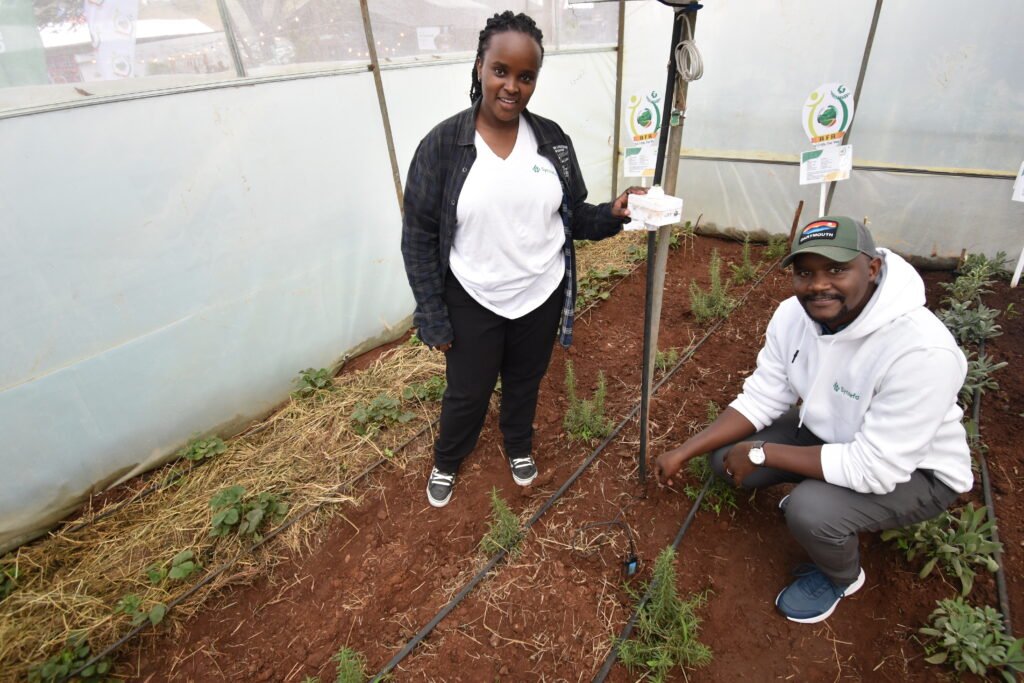By Zablon yugi
For a commercial vegetable or fruit farmer, the dry season is the time to try to produce more from your farm for the market and make a kill, taking the advantage of the off-season for the majority of growers. Yet the daily farm chores can be quite tiring, with one having to visit the farm many times a day to check the irrigation system is working optimally.
It could get worse if the farmer is using traditional irrigation methods. “This is where drip irrigation comes in to ensure plant roots get water directly and without any hassle through this process,” said Timothy Wanjau, an agricultural engineer and agronomy consultant working with small farmer groups in Kajiado County.
With drip irrigation, every drop of water is utilised efficiently, encouraging healthy plant growth and fuller yields by minimising evaporation and runoff.
By combining the efficiency of drip systems with the data-backed insights of smart technology, farmers can improve their crop yields by a considerable margin.
“Taking the sustainable gardening initiatives a step further, integrating smart technology with drip irrigation systems results in the best allocation of water resources and improved income for growers,” said Mr Wanjau.
Dr David Ndegwa, the Lead Technical Engineer at Agrotunnel International Ltd, a company specialising in greenhouses and drip irrigation solutions, said integrating smart technology with drip irrigation is essential for the ongoing shift toward data-driven decisionmaking in crop production.
“Smart drip irrigation systems use advanced technology to optimise water usage and ensure crops receive the precise amount of moisture and even in some instances, through fertigation, the right amount of fertiliser they need,” said Dr Ndegwa.
Smart drip irrigation, he said, enables farmers or farm managers to automate their drip irrigation system and access real-time analytics, gives them power to make the right decisions at the right time. This enables control of irrigation from any location, at any time through a coordinated system that helps in getting instant notifications about low soil moisture, temperature, burst pipes, and clogged filters and know when to take action.
“In agriculture, it’s important to make timely decisions. One error and a farmer can endanger a whole year of hard labour,” said Dr Ndegwa.
How smart irrigation works
Smart irrigation systems are equipped with sensors and IoT devices placed in different regions across a farm.
They gather realtime data on soil moisture, fertiliser, temperature, and weather conditions then provide real-time data on the state of the soil and environmental factors, enabling precise monitoring of irrigation needs. “With sensors and IoT devices in place, there’s no need for guesswork or relying on farmworkers to manually operate the irrigation system—it’s completely automatic,” said Dr Ndegwa.
In developed counties such as in the United States, some smart irrigation systems also tune in to a local weather data system to monitor and adjust watering schedule so that should it start raining while a farmer’s system was running, smart rain sensors and controllers will automatically shut off to avoid water wastage.
Cloud-based analytics
The sensor data is transmitted to a farmer’s cloud-based account, where it is analysed using intelligent algorithms. This analysis helps determine the exact water or fertiliser requirements of the crops, taking into account factors like soil conditions and weather forecasts.
Automated irrigation control
Based on the insights from the cloud system, the smart irrigation system automatically activates the drip irrigation setup. Water is delivered directly to the root zones of the plants in precise quantities, minimising wastage and ensuring uniform distribution. “Most smart drip irrigation kits are designed to automatically irrigate your crops without any human input therefore providing a durable space to grow your vegetables, flowers and fruits all year round,” said Dr Ndegwa.
Farmer notifications
The system communicates with farmers through mobile apps or SMS, providing real-time updates and actionable insights. Farmers can receive alerts about irrigation schedules, system performance, or potential issues, ensuring they remain informed at all times.
Remote management
Farmers can monitor and control their irrigation systems remotely via the app. Adjustments to irrigation schedules or water flow can be made with a few taps, making it convenient to manage the system even from a distance. “When this service is linked to farmers’ cloud-based account, they are also able to further track profitability and crop production all under one roof,” said Dr Ndegwa.

